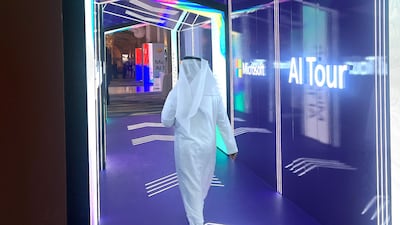Imagine a future where innovation and intelligence are so seamlessly woven into everyday life that it feels as natural as breathing. In this world, artificial intelligence is not just a tool but a societal operating system – human-centric, used responsibly and visionary in its reach.
This is not a distant dream; it is the one of the UAE’s strategic ambitions.
If the country’s track record offers any guidance, then the Emirates is well on its way to making this future a reality. Across many sectors – aviation, finance, health care, energy and space – the UAE has already elevated itself to global prominence. Each ascent has been achieved with leadership, talent development and the pursuit of excellence.
This formula is what we call the UAE’s flag-carrier model – a commitment to becoming a global standard-bearer. This time it is AI’s turn, and the stakes are even higher.
Take Emirates airline. Launched in 1985 with two leased planes and an audacious vision, Emirates was never intended to be a regional shuttle. It was conceived with excellence as part of its strategy.
Institutional craftsmanship followed and Emirates became an extension of Dubai’s ambition – built on strategic investment, global branding, infrastructure and, crucially, people. Tim Clark’s leadership did not just grow a carrier – it established a worldview. “We know exactly where we want to go,” he said in an interview last year. That clarity still defines the UAE’s development ethos.
Just as Emirates became symbolic of Dubai’s international ambitions, AI today represents the technological extension of the UAE’s next chapter of global leadership.
The UAE’s “flag carrier” model – a fusion of strategic clarity and national ambition – is already transforming key sectors. In finance, the Dubai International Financial Centre and the Abu Dhabi Global Market Financial Free Zones were established not to mimic western hubs but to set new global standards.
With innovation-first regulatory frameworks, they have become magnets for the world’s largest financial institutions, FinTechs, venture capitalists and global funds seeking stability and forward-looking governance. Digital finance shows the same foresight. ADGM pioneered regional crypto regulation; Dubai’s Virtual Assets Regulatory Authority followed as the world’s first dedicated virtual asset regulator. These institutions enforce rules and shape markets.
In the domain of scientific ambition, the UAE Space Agency and the Mohammed bin Rashid Space Centre launched the Hope Probe, a mission to Mars that made the UAE the first Arab country, and only the fifth globally, to reach the Red Planet. But this was not just about reaching orbit, it was about promoting the idea that the UAE belongs in every future-defining conversation.
That aspiration now points to AI.
Institutions such as the Dubai Future Foundation and the Dubai Centre for Artificial Intelligence are embedding innovation into public-private partnerships. They position Dubai as a laboratory for the future and a “flag carrier” of systemic innovation. From accelerators and immersive programmes to the AI Sandbox for prototyping solutions, Dubai is designing future systems.
At the heart of the UAE’s AI vision is the pursuit of intellectual sovereignty. The Mohamed bin Zayed University of Artificial Intelligence, the world’s first AI-only graduate university, anchors this ambition, which is designed to export talent as much as to develop it. Paired with the newly announced 5GW UAE-US AI Campus, this is infrastructure as well as intent.
The UAE is building sovereign computing capacity to shape the future of access, trust and innovation, placing AI closer to the world’s most pressing challenges, from education to energy. This is not a replica of others’ models but a flag carrier for reaching a more equitable, globally inclusive AI frontier. An emphasis on cultivating in-house expertise reflects a deeper truth: you cannot outsource vision.
This vision has taken a significant leap forward with the launch of Stargate UAE, the first international deployment of OpenAI’s infrastructure. Anchored by a planned 1GW computing cluster in Abu Dhabi, it marks the UAE’s shift from early mover to global co-architect.
As the first nation with plans to enable ChatGPT access at scale, and with infrastructure designed to serve nearly half the world’s population, the UAE is laying the groundwork for a more inclusive, sovereign and globally aligned AI future. In yet another major development announced after US President Donald Trump’s Gulf visit, MGX, an Abu Dhabi-based investment firm for AI, and Nvidia announced plans to build the largest AI campus in Europe along with French companies.
All this proves that the “flag carrier” model now flies on fibre and silicon, exporting not just capital, but co-architecting conviction with strategic partners in Europe’s largest AI campus.
If the story of Emirates airlines teaches us anything, it is that the UAE knows how to scale an idea into an institution and a service into a standard. The same DNA is now being re-engineered into a vision for artificial intelligence.
The UAE does not seek to build AI for AI’s sake. It seeks to build a better future, and AI is the megastructure helping it get there. “Flag carrier” status is not about being first, it is about being trusted, resilient and inspiring. These latest developments are a natural evolution of the “flag carrier” model – extending from national infrastructure to shared innovation and global contribution. And the UAE knows exactly where it wants to go and how to get there.
Mana Al Suwaidi, is a former diplomat and executive chairman of Strategi, a Dubai-based international business relations consultancy.
Samir Safar-Aly is a regulatory, compliance and AI ethics lawyer in the UAE

